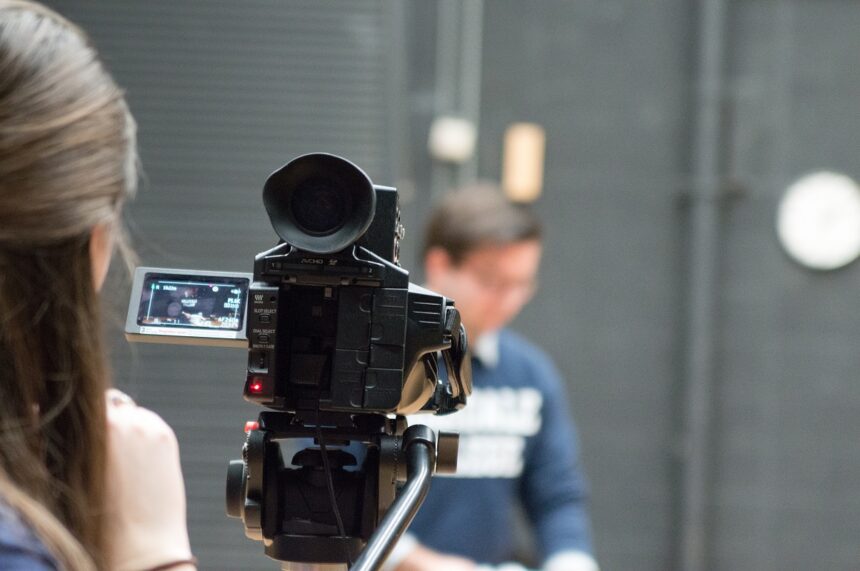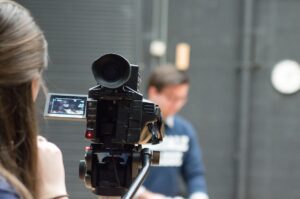“Be connected in the moment and make magic happen.”
This was actress Dwandra Lampkin’s advice to the students in her Acting for the Camera class before they began their exercises.
Lampkin brings her experience with film and television to the Acting for the Camera class for the first time this semester. Lampkin, associate professor of theatre at Western Michigan University, was asked by Professor of Theatre George Angell if she would be willing to teach a class here. He had met Lampkin while she was adjudicating Hillsdale’s performance of “Almost Maine” for The Kennedy Center American College Theater Festival.
Senior Catherine Coffey, an English and theatre double major, didn’t really have an idea of what acting for film and television meant before taking this class. Hillsdale’s theatre department classes typically center around acting for the stage. Coffey soon realized the difference between stage acting and camera acting.
“A lot of people, like me, had very generalized, preconceived notions about what acting for the camera is and what television and film is like for an actor,” Coffey said. “I learned very quickly in this class that the differences are bigger than I thought. So basically this class is bridging that gap. We’re all theater actors here and acting for the camera is a very different technique. How you angle yourself for the camera, how you speak, how you move, where you look. Even that’s important. I did a scene once in class and my eyes were all over the place and I didn’t think that was a problem because it’s not a problem on stage. But the second you sit down to watch it, it looks terrible. It’s very particular and it takes a lot of practice, but it’s been fun.”
Sophomore Elena Creed noted that the face and the eyes play a more crucial role when performing for the camera.
“It’s taught me a lot about how to show your emotions and how to be in control of your face,” Creed said. “In theater, your audience is far away. They’re seeing your whole body, so your facial expressions aren’t really important. Often they need to be overdone so people in the back can see you. But when the camera’s so close up on your face, you have to be really, really focused on everything that you want to do.”
Acting for the Camera is also different from other acting classes at Hillsdale in the way it’s run. During class, students film scenes assigned from previous class periods, watch them, and analyze them.
“In acting classes, you just kind of do it and do it a million times over,” Coffey said. “Whereas in film class, you do it and then you watch it and have to pick apart every little thing — which has been really helpful for me.”
Lampkin offers students personal acting experience — she knows what it means to be a stage and camera actress. Before becoming a professor, Lampkin pursued both stage and screen acting in New York City, gaining credits on “Law & Order” and “Law & Order: SVU” among many others.
“I was living in New York City doing my acting thing and I got a phone call from a good friend of mine who had taught at Ball State University in Indiana,” Lampkin said. “They were looking for someone to fill in for one of their colleagues who was going on sabbatical, just for nine months.”
According to Lampkin, nine months turned into eight years. After a while, though, Lampkin felt the itch to get back into professional acting. She then found the professional theaters around Indiana. While teaching and acting, she discovered something.
“I realized that all the work that I was doing as a professional actress was only serving me,” Lampkin said. “I was getting the roles and I was getting paid the money to play the role. What teaching did for me was make me realize that everything that I am immersing myself in as a professional actress I get to actually pass on to young students who are trying to do the same thing. So that’s just a wealth of knowledge being in the business everyday. I got to share it with other people and it became rewarding to me.”


